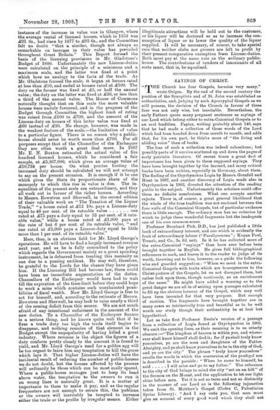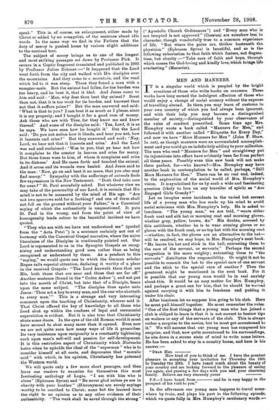SAYINGS OF CHRIST.
" THE Church has four Gospels, heresies very many," wrote Origen. By the end of the second century the
position of the Synoptists and of St. John was established as authoritative, and, judging by such Apocryphal Gospels as we still possess, the decision of the Church in favour of thee(' four was not only wise, but inevitable. Nevertheless, the early Fathers quote many pregnant sentences as sayings of our Lord which belong either to extra-Canonical Gospels or to an oral tradition. Papias, writing probably about 140, says that be had made a collection of those words of the Lord which had been handed down from mouth to mouth, and adds that, for his own part, he thinks more of " the living and abiding voice" than of books.
The loss of such a collection was indeed calamitous ; but
possibly parts of it survive scattered up and down the pages of early patristic literature. Of recent times a great deal of importance has been given to these supposed sayings. They have been brought together by the learned, and many critical books have been written, especially in Germany, about them. The finding of the Oxyrhynchus Logia by Messrs. Grenfell and Hunt in 1897, and another discovery of Login made also in Oxyrhynchus in 1903. directed the attention of the reading public to the subject. Unfortunately the scholars could offer them no definite conclusions. What one accepts another rejects. There is, of course, a great general likelihood that the whole of the true tradition was not enclosed between the four walls of the Canonical Gospels, but of particular evidence there is little enough. The ordinary man has no criterion by which to judge these wonderful fragments but the inadequate one of his own common-sense.
Professor Bernhard Pick, D.D., has just published a little
hook of extraordinary interest, and one which is evidently the fruit of extraordinary labour (" Paralipomena"; Regan Paul, Trench, and Co., 3s. 6d. net). In it he has collected more of the extra-Canonical "sayings" than have ever before been brought together in English. He gives full bibliographical references to each, and leaves it to the reader to judge of its worth, throwing out to him, however, as a guide the following wise and guarded suggestion : " When we meet in the extra- Canonical Gospels with traits which are homogeneous to the Christ-picture of the Gospels, let us not disregard them, but rather look upon them, though cautiously, as an enrichment of the same." He might have added a warning as to the great danger we are all in of seizing upon passages calculated to fill up the obvious lacunae of the Gospel, which may well have been invented for that very purpose. But enough of caution. The fragments here brought together are in many cases so intrinsically true and beautiful as to be well worth our study though their authenticity be at best but hypothetical.
Let us take first Professor Swete's version of a passage
from a collection of Logia found at Oxyrbynchus in 1903. We omit the opening lines, as their meaning is to us utterly obscure :—" The kingdom of heaven is within you, and whoso- ever shall know himself shall find it; for if ye shall truly know yourselves, ye are the sons and daughters of the Father Almighty, and ye shall know yourselves to be in the city of God, and ye are the city." The phrase " truly know yourselves" recalls the words in which the conversion of the prodigal son is described in the parable : " When he came to himself, he
said I will arise and go to my father." The reference to the city of God •brings to mind the city "set on all hill" of the Sermon on the Mount, and the application to let our light shine before men. Yet it is not so terse and not so distinctly in the manner of our Lord as is the following injunction taken from St. Matthew's Gospel (Codex C, Palestinian Syriac Library): " And I say unto you, that men must give an account of every good word which they shall not speak." This is, of course, an enlargement, either made by Christ or added by an evangelist, of the sentence about idle words. In the same way we find in the Fathers that the ,duty of mercy is pushed home by various slight additions to the received text.
The subject of mercy brings us to cue of the longest and most striking passages set down by Professor Pick. It occurs in a Coptic fragment translated and published in 1903 by Professor Julius Hamer :—" It happened that .the-Lord went forth from the city and walked with His disciples over the mountains. And they came to a mountain, and the road which led to it was steep. There they found a man with a sumpter-mule. But the animal had fallen, for the burden was too heavy, and he beat it, that it bled. And Jesus came to ,him and said : ' Man, why dolt thou beat thy animal ? Seest , thou not, that it is too weak for its burden, and knowest thou not that it suffers pains ?' But the man answered and said : What is that to you ? can beat it as much as I please, since it is my property, and I bought it for a good sum of money. .Ask those who are with Thee, for they know me and know thereof.' And some of the disciples said: 'Yea, Lord, it is as he says. We have seen how be bought it.' But the Lord . said : 'Do you not notice how it bleeds, and hear you not, bow it laments and cries?' But they answered and said: Nay, Lord, we hear not that it laments and cries.' And the Lord was sad and exclaimed : ' Woe to you, that ye hear not bow it complains to the creator in heaven and cries for mercy. But three times woes to Lim, of whom it complains and cries in its distress.' And He came forth and touched the animal. And it arose and its wounds were healed. And Jesus said to the man : Now, go on and beat it no more, that you also may find mercy.' " Sympathy with the sufferings of animals finds few expressions in the New Testament. "Doth God take care for oxen ?" St. Paul scornfully asked. But whatever view we may take of the personality of our Lord, it is certain that His mind is not to be measured by the mind of His age. "Are not two sparrows sold for a farthing? and one of them shall not fall on the ground without your Father," is a Canonical saying of which the authenticity is unquestioned. It puts St. Paul in the wrong, and from the point of view of homogeneity lends colour to the beautiful incident we have quoted.
"They who are with me have not understood me" (quoted from the " Acta Petri ") is a sentence certainly not out of harmony with the Canonical Gospel narrative, where the naïve literalness of the Disciples is continually pointed out. Our Lord is represented to us in the Synoptic Gospels as recog- nising and understanding good men rather than as being . recognised or understood by them. As a pendant to this "saying," we would quote one to which the German scholar Ropes calls especial attention, declaring it worthy of a place in the received Gospels : " The Lord knoweth them that are His, both those that are near and those that are far off." Another sentence (found in the " Codex Askew "), and not put • into the mouth of Christ, but into that of a Disciple, bears upon the same subject. " The disciples thus spike unto Jesus: 'Thou art a key to every man, and the one who shutteth to every man.'" This is a strange and very interesting comment upon the teaching of Christianity, whoever said it. That Christ offered the key of knowledge to all those who lived shut up within the confines of legal and ceremonial superstition is evident. But it is also true that Christianity ',huts some doors. In the eyes of the old Roman world it must have seemed to shut many more than it opened. Even now we are not quite sure bow many ways of life it proscribes. Its very insistence upon reciprocity is a constantly tightening .curb upon man's self-will and passion for self-development.
• It is this restrictive aspect of Christianity which Nietzsche hates when he upholds the ideal of the "superman " who is to consider himself at all costs, and deprecates that " morello acid " with which, in his opinion, Christianity has poisoned :the Western world.
We will quote only a few more short passages, and then leave our readers to examine for themselves this most fascinating anthology of Logia. "I am with him who is alone" (Ephraem Syrus) and " Be never glad unless ye are in .charity with your brother" (Hieronymus) are surely sayings worthy to.be ascribed to Christ; none but the learned have the •right to an opinion as to any other evidence of their authenticity. "The weak shall be saved through the strong"
(" Apostolic Church Ordinances") and "Every man who' is not tempted is not approved " (Caseian) are somehow leas: in character, though wonderfully true to a common experience of life. "But where the pains are, thither hasteneth the physician" (Ephraem Syrus) is beautiful, and so is the following exhortation to that faith 'which fosters, not dogma- tism, but charity :—" Take care of faith and hope, through which comes the God-loving and kindly love, which brings lib everlasting" (Macariue).



















































 Previous page
Previous page